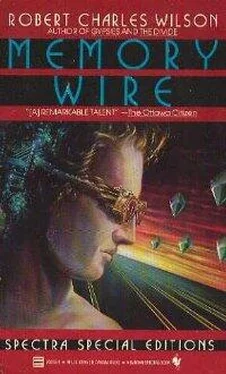Robert Wilson - Memory Wire
Здесь есть возможность читать онлайн «Robert Wilson - Memory Wire» весь текст электронной книги совершенно бесплатно (целиком полную версию без сокращений). В некоторых случаях можно слушать аудио, скачать через торрент в формате fb2 и присутствует краткое содержание. Год выпуска: 1987, ISBN: 1987, Издательство: Bantam Spectra, Жанр: Фантастика и фэнтези, на английском языке. Описание произведения, (предисловие) а так же отзывы посетителей доступны на портале библиотеки ЛибКат.
- Название:Memory Wire
- Автор:
- Издательство:Bantam Spectra
- Жанр:
- Год:1987
- ISBN:978-0-553-26853-9
- Рейтинг книги:4 / 5. Голосов: 1
-
Избранное:Добавить в избранное
- Отзывы:
-
Ваша оценка:
- 80
- 1
- 2
- 3
- 4
- 5
Memory Wire: краткое содержание, описание и аннотация
Предлагаем к чтению аннотацию, описание, краткое содержание или предисловие (зависит от того, что написал сам автор книги «Memory Wire»). Если вы не нашли необходимую информацию о книге — напишите в комментариях, мы постараемся отыскать её.
Memory Wire — читать онлайн бесплатно полную книгу (весь текст) целиком
Ниже представлен текст книги, разбитый по страницам. Система сохранения места последней прочитанной страницы, позволяет с удобством читать онлайн бесплатно книгу «Memory Wire», без необходимости каждый раз заново искать на чём Вы остановились. Поставьте закладку, и сможете в любой момент перейти на страницу, на которой закончили чтение.
Интервал:
Закладка:
The dreamstones, dubbed “oneiroliths” by a bemused Federal University geologist, were more valuable than even a greedy forao could have imagined. There was talk— hushed, then skeptical, finally awed—of their extraterrestrial origin. Carbon tests were of course meaningless; but the small stones must have lain a considerable time in the shallow soil of the Basin, relics of some astronomical impact vastly older than the bandeirantes. Moreover, the oneiroliths were not merely passive. They were encoded, deeply layered with information, every molecule a dictionary of atoms, a syntax of electrons. Their language was binary and universal. They contained a new physics, a new cybernetics; they hinted at wholly new technologies.
The implication was obvious. Control of the oneiroliths was control of the planet’s economic and political future. In a century that had begun without fanfare twenty years earlier, the discovery was interpreted as a token, at last, of real change: the New Reconstruction, the industrial reshaping of a global economy. For the first time since the ecological debates, the great powers focused their attention on the Brazilian hinterland. A new kind of forao began to invade the wilderness. The impact site—a deposit of fragmentary stones miles broad and indefinitely deep—was staked and claimed according to ancient Brazilian mineral-rights laws.
There were of course obstacles to this millennium. The Valverde regime was in political trouble. Insurgents had captured a provincial capital; there was the possibility that vital roads might be endangered.
Intervention was called for. A methodical war was undertaken.
Here, Keller’s nightmares became more personal.
His second night in the Floats a storm came up, sheets of tepid rain off the ocean, and Keller sat drinking with Byron Ostler under the tin eaves of Byron’s bamboo patio. The water here was dense with balsas and boat shanties, twining among the open waterways the locals called canals. It was an artists’ neighborhood, boat shacks lit up with Chinese lanterns, silhouettes of windwheels churning against the watery glow of the urban mainland; there was only the faint rocking of the floorboards to remind him that they were balanced a half mile out over the continental shelf, precarious on a foundation of pontoons and anchors.
Byron talked about Teresa, drinking Mexican beer from a squat bottle and plugging memory cards into a music generator. Keller, listening, gazed out across a canal of dark water.
“She’s not in danger,” Byron said. “I believe that. We’re not in danger. Wexler has it all set up.” He pulled at his beer. “Any sign of danger, Ray, I would bring her back. No question. But it was her project from the beginning. She was with Wexler in Carmel when he set up the trip—she may have helped talk him into it.”
Maybe, Keller thought. But she had impressed him mainly with her fragility. Something in the broad set of her mouth, the curious downturn of her eyes. If Byron claimed to care for her, Keller thought, then maybe he should have found a way out of this. He said, “Still—”
“I know.” The ’lith chemist stood up and tossed his empty bottle into the dark canal beyond the railing of his float shack. “Whatever you mean to say, Ray, I thought of it, all right? It matters to me what happens to her. It really does. But she needs to go. She has this thing about the stones. She needs to go farther… deeper…”
Keller said, “You sold it to her.”
There was a silence, and Keller was briefly afraid he might have overstepped the bounds of this old, awkward friendship. But then Byron said quietly, “I didn’t sell it to her. I gave it to her.”
Keller gazed patiently across the water.
“Three years ago,” the chemist said. “You didn’t see her, Ray. She was making money hawking scrap metal to the galleries and spending it all on lab opiates. Synthetic enkephalins. Very, very bad. She came to me with a wad of cash in her hand, and her hand was, you know, like a claw, anorexic. ‘You sell ’liths,’ she said. I said yeah. I got to know her a little. She showed me where she lived— a comer of an old bulk-oil terminal in the harbor slums, stick furniture and a Mason jar full of pills. I brought in a doctor to look at her. He said her neuropeptides were seriously unbalanced. She was courting death. I mean that. Dancing with it. I said, ‘You’ll die.’ She didn’t even answer; she just nodded—it was true, so what. But the stone was a new thing for her. One more drug, I guess she thought, but it didn’t tum out that way. She took it in her hand—”
“Visions,” Keller said.
“It doesn’t work for everybody. For her it was all there. New worlds. She wanted to get it down somehow. I bought her the tools for these crystal paintings she’s been doing, trance landscapes. We weaned her off the enkephalins until her neurochemistry settled down, and she’s been clean ever since.” He held up a bony hand. “Three years. ”
“The stones did that?”
“I guess they did. Sometimes …” Byron smiled hollowly. “Sometimes I like to think I did it.”
“But she’s going to Pau Seco,” Keller said.
The chemist peered out across the float shacks, the canal of dark seawater.
“It was a deal she made,” he said softly. “I think that’s all it ever was. I tried to check out her history, found out she doesn’t have one. She came out of the big fire back in ’37; she was only a kid, third-degree burns and no parents and traumatic memory loss. A refugee family took her in, named her—she didn’t even have a name. And then she started on the pills. Killing herself, you know, but slowly. And the stones didn’t change that. They touched something inside her, woke her up a little bit, but it was only ever a trace.” He regarded Keller bleakly. “A little detente between Teresa and death. But the stones we have aren’t whole, Ray. They’re like pictures torn out of a magazine. Whatever she sees in there, she needs to see it more clearly.”
Keller said, “She might not find what she wants. She might be going down there to die.”
“Or live,” Byron replied. His fists were clenched. He said firmly, “I believe that.”
A little unsteadily, half drunk now, Byron led Keller back into the houseboat, to a lower level, sealed, underwater maybe—it was claustrophobic—through a dim stucco anteroom in which a single red light burned.
“Here,” he said quietly, opening a second door. “You wanted to see it? Here.”
It took a while for Keller’s eyes to adjust.
There were vats and vats of dark fluid moving in the swell. The room was swelteringly hot. Must have a generator down here somewhere, Keller thought. Christ! It was almost spooky … a thousand ongoing gestations in those photophobic jars, silent and quite alien.
This was where Byron grew his dreamstones.
Keller recorded it all meticulously. He was an Angel; it was his job. Everything he saw, everything he’d seen since the moment Leiberman installed his memory, was spooling down indelibly into his AV memory. Ultimately, the chip behind his spine would contain thousands of hours of raw experience, footage (it was still called “footage”) no camera could ever capture.
Byron displayed his work with a flourish of drunken pride Keller could not assay for sincerity. “It’s the same technology they use in the government labs. Just scaled down a little. The fluid in the vats is a supersaturated solution, only a little more complex than seawater. Given the medium, the rest is simple. The ’liths reproduce. ‘Reproduce’ is maybe not the correct word—they aren’t technically living things—but I don’t know what else you’d call it. The stone releases a transcriptaselike substance, which acts as a kind of seed crystal. New stones grow around it. Identical copies. You can’t tell the new from the old. The technology for growing stones was among the first data downloaded from the first significant samples, which means whoever made these things devoted a lot of redundancy to it. The Exotics—whoever they are or were—wanted us to spread these things around.”
Читать дальшеИнтервал:
Закладка:
Похожие книги на «Memory Wire»
Представляем Вашему вниманию похожие книги на «Memory Wire» списком для выбора. Мы отобрали схожую по названию и смыслу литературу в надежде предоставить читателям больше вариантов отыскать новые, интересные, ещё непрочитанные произведения.
Обсуждение, отзывы о книге «Memory Wire» и просто собственные мнения читателей. Оставьте ваши комментарии, напишите, что Вы думаете о произведении, его смысле или главных героях. Укажите что конкретно понравилось, а что нет, и почему Вы так считаете.












